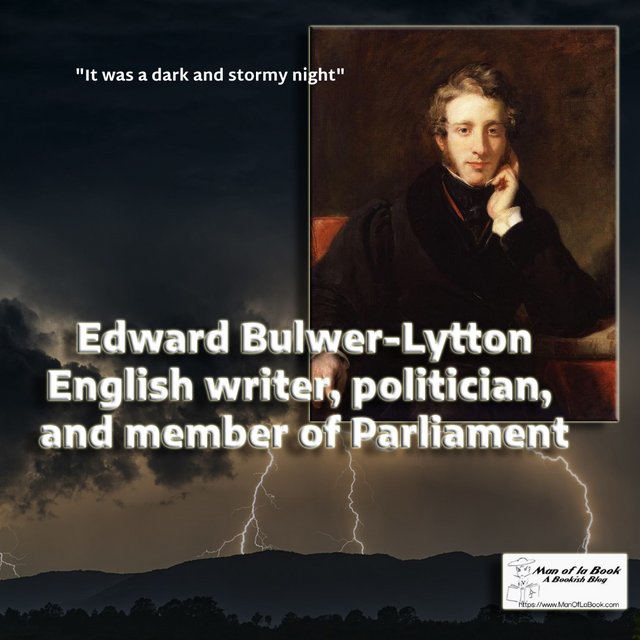Edward Bulwer-Lytton (25 May, 1803 – 18 January, 1873) was a writer, politician, and member of the English Parliament. He was very famous during his lifetime for his political work, as well as his historical-fiction books.

Books by Edward Bulwer-Lytton*
Fun facts about Edward Bulwer-Lytton:
- Edward George Earle Lytton Bulwer-Lytton, 1st Baron Lytton was born in London. His father was General William Earle Bulwer, and his mother, Elizabeth Barbara Lytton.
- When his father died, young Lytton and his mother moved to London, where he was tutored. At age 15, Wallington, the tutor encouraged the young man to publish his first work called Ishmael and Other Poems, for which his mother paid
- The works of Sir Walter Scott and Lord Byron were very influential during Mr. Lytton school days. In fact, Ishmael and Other Poems, is written in Byronic style. The book did not sell very well, but the young author received a letter from Walter Scott acknowledging him.
- This was the time when Mr. Lytton first fell in love. The woman, however, was induced by her father to marry someone else. Sadly, she died by the time Lord Lytton attended Cambridge. However, her death affected him all his life.
- After finishing his studies, Edward Lytton spent several months in France, writing and reading French literature. Upon coming back to England, he married a poor, yet lively, Irish woman named Rosina Anne Doyle. His mother didn’t approve and cut off his allowance, which forced Lytton to write for a living.
- Over the next decade Edward Lytton wrote 13 novels, poems, essays, plays, short stories, history books, reviews, and more. He also edited a monthly magazine.
- Edward Lytton’s fictional stories became very popular during that time. In fact, in one of his stories, the character insisted on wearing black to formal dinners, which started a fashion trend that lasted to this day. He even convinced Charles Dickens to make the ending of Great Expectations to make it more palatable to the general public as Pip and Estella did not end up as a couple. Lytton’s 1862 novel A Strange Story influenced Bram Stoker’s Dracula.
- His stories coined some famous phrases which are still common today. These included “pursuit of the almighty dollar” (The Coming Race, 1871), “the pen is mightier than the sword” (Richelieu; Or the Conspiracy, 1839), “dweller on the threshold” (Zanoni, 1842), among others.
- “It was a dark and stormy night”, the opening phrase of the play Paul Clifford (1830) is considered to be one of the worst opening sentences of all time. It had even inspired the annual Bulwer-Lytton Fiction Contest, held annually since 1982, in which contestants try to outdo each other by writing terrible openings.The full quote is:
It was a dark and stormy night; the rain fell in torrents—except at occasional intervals when it was checked by a violent gust of wind that swept up the streets (for it is in London that our scene lies), rattling along the housetops, and fiercely agitating the scanty flame of the lamps that struggled against the darkness.
- Edward Lytton’s stories inspired several operas including Richard Wagner’s, Rienzi, der Letzte der Tribunen (1842), William Henry Fry’s Leonora (1846) was based on The Lady of Lyons, Enrico Petrella’s Jone (1858) which became his most successful one, and Frederic Cowen’s Pauline (1876) were based on The Last Days of Pompeii, and Verdi’s Aroldo (1857) took its title character from Harold, the Last of the Saxons.
Books by Edward Bulwer-Lytton*
Zohar – Man of la Book
*Amazon links point to an affiliate account, the money is usually spent on books
Source:
Edward Bulwer-Lytton | Wikipedia
Edward George Earle Bulwer-Lytton, 1st Baron Lytton-British author | Britannica
Edward Bulwer-Lytton: THE AUTHOR | Editor Eric
Five Reasons Everyone Should Know Sir Edward Bulwer-Lytton | Interesting Literature
The Story Behind “It Was A Dark And Stormy Night” | Dictionary.com


No Comments